Summary :
In today’s digital world, having a strong online presence is crucial for businesses and individuals alike. One of the key ways to achieve this is through effective keyword optimization. Understanding keyword optimization strategies is essential for businesses aiming to increase their online visibility and attract more visitors to their websites.
Just as businesses use tools to understand their audience better, mastering keyword optimization techniques can significantly impact your website’s search engine rankings and organic traffic. In today’s digital world, where data is everywhere, knowing how to choose the right keywords is like turning scattered information into valuable insights. By picking the best keywords and using them cleverly in your website content, you can improve your chances of showing up higher in search results and getting noticed by more people. Just like using analytics tools to track performance, keyword optimization can help your business stand out and thrive online.
This guide will help you understand how to use keywords to improve your website’s visibility online. We’ll break it down into 7 easy steps, so you can learn how to optimize your keywords and get more people to see your website.
Understanding Keyword Optimization
Keyword optimization is like giving your website a map so more people can find it on search engines. Optimization is about using those keywords in the best spots and ways on your site to help it show up higher in search results. Keyword optimization involves strategically incorporating relevant keywords into various elements of your website to improve its visibility in search engine results. It’s about more than just selecting the right keywords; it’s about using them effectively in titles, headings, meta descriptions, content, and other areas to attract organic traffic.
This ongoing process helps ensure that your website ranks higher for specific search queries, ultimately increasing its chances of being discovered by your target audience.
Why Keyword Optimization is Important?
Did you know that so many blogs and articles are being published every day, and it can be hard to get noticed? One way to stand out is to use keywords that people are searching for. This makes it easier for people to find your content when they’re looking for something related to what you’re selling.
If people can’t find your content, they won’t read it or buy what you’re selling. By using the right keywords, you can attract more people to your website and make it more likely that they’ll become customers. This can help you in many ways!
Benefits of Keyword Optimization Strategies
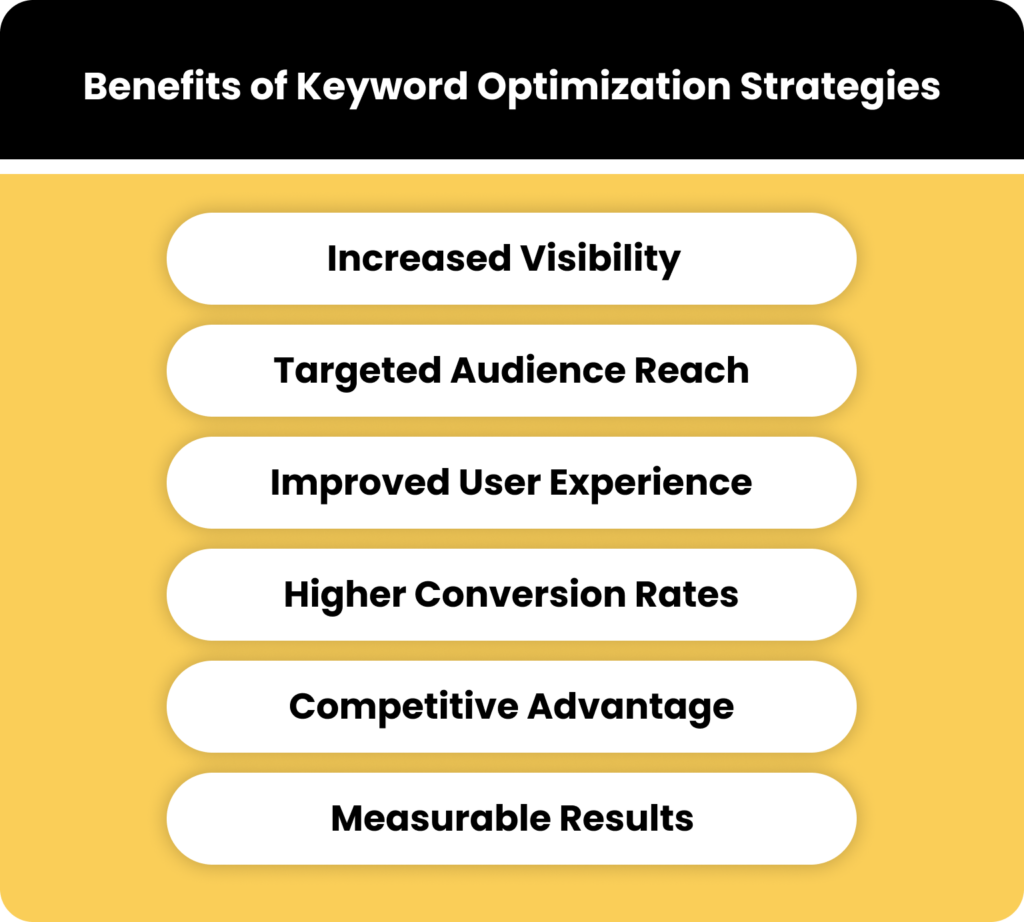
Keyword optimization strategies offer several benefits for improving the visibility and effectiveness of your online content. This includes :
1) Increased Visibility
By using the right keywords, you can make your website more visible to people searching for things related to your business. This can bring more people to your website and help you get more traffic.
2) Target Audience Reach
When you use keywords that your target audience is using, you can attract people who are actually interested in what you offer. This makes it more likely that they’ll become customers or clients.
3) Improved User Experience
By providing content that matches what users are searching for, you can make their experience on your website better and more enjoyable. This can lead to more engagement and return visits.
4) Higher Conversion Rates
When people can easily find your content when they’re searching for something related to your products or services, you have a better chance of converting them into customers or clients.
5) Competitive Advantage
By optimizing your keywords effectively, you can stay ahead of your competitors in search rankings. This means you can maintain a competitive edge in the online marketplace.
6) Measurable Results
With keyword optimization, you can see how well your strategy is working and make changes to improve it. You can track things like:
- How well your website is ranking on search engines
- How many people are visiting your website
- How many people are actually buying or signing up for what you’re offering
By tracking these metrics, you can make adjustments to your strategy to get better results over time.
7 Keyword Optimization Strategies to Rank Higher
Discover powerful techniques to boost your website’s visibility and climb the search engine rankings with these 7 keyword optimization strategies.
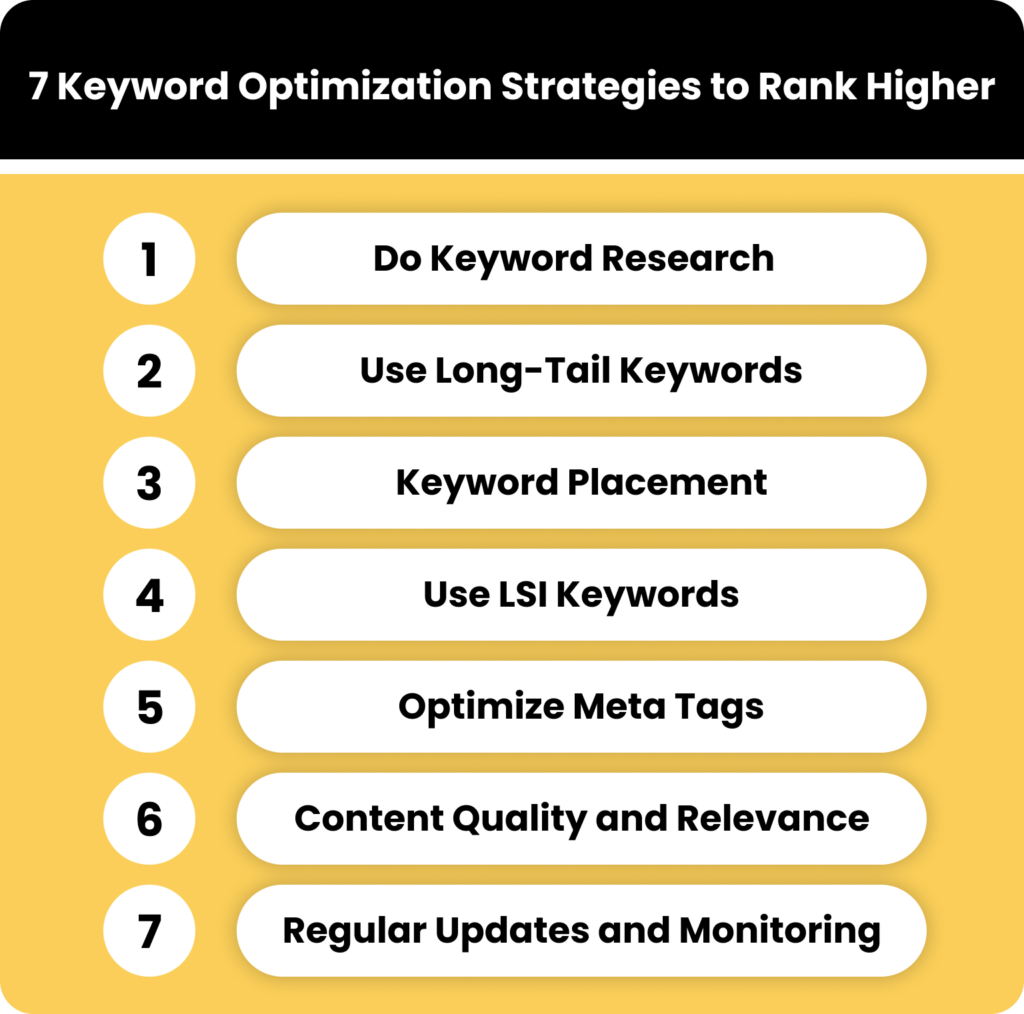
1) Do Keyword Research
Research on what people are searching for online in relation to your topic. This initial step is fundamental in keyword optimization strategies. Tools such as Semrush’s Keyword Magic Tool can assist you in identifying commonly used phrases that are relevant to your content. This research provides valuable information that guides the selection of keywords for optimization.
First, enter a simple word that relates to the main topic of your website. Then, select the location where most of your audience is based, and click the “Search” button.

This tool will give you a list of words that are similar to the one you entered. It will also provide helpful numbers and information to guide you.
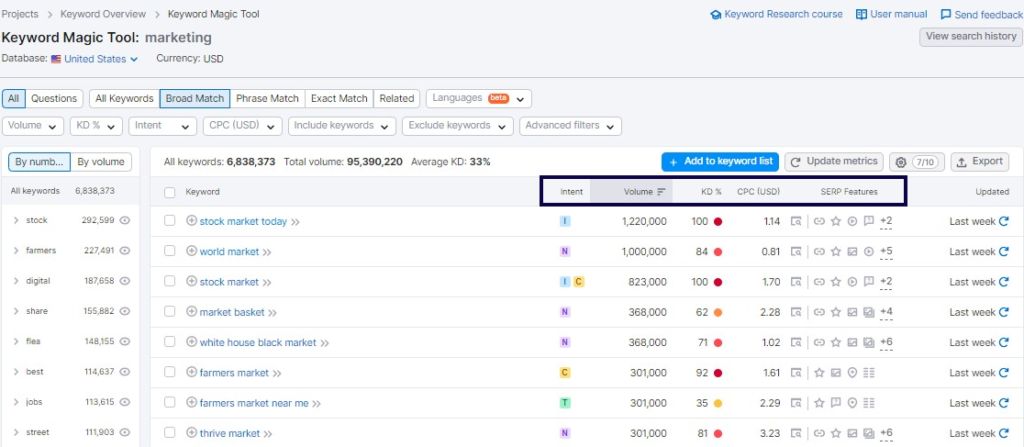
You can use a filter called “Keyword Difficulty” to only see words that are easier to compete with. Just choose a filter or type in numbers like 0 to 49, and then click “Apply.”
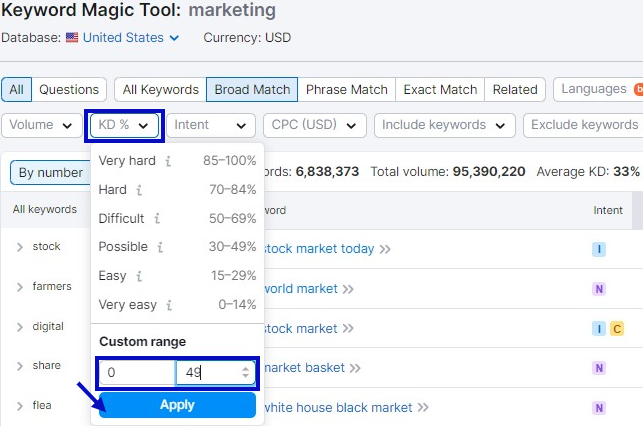
You’ll see a list of keywords with difficulty scores in this range. You can sort them by volume to see which ones have the most potential for SEO traffic. Just click on the “Volume” header to do this.
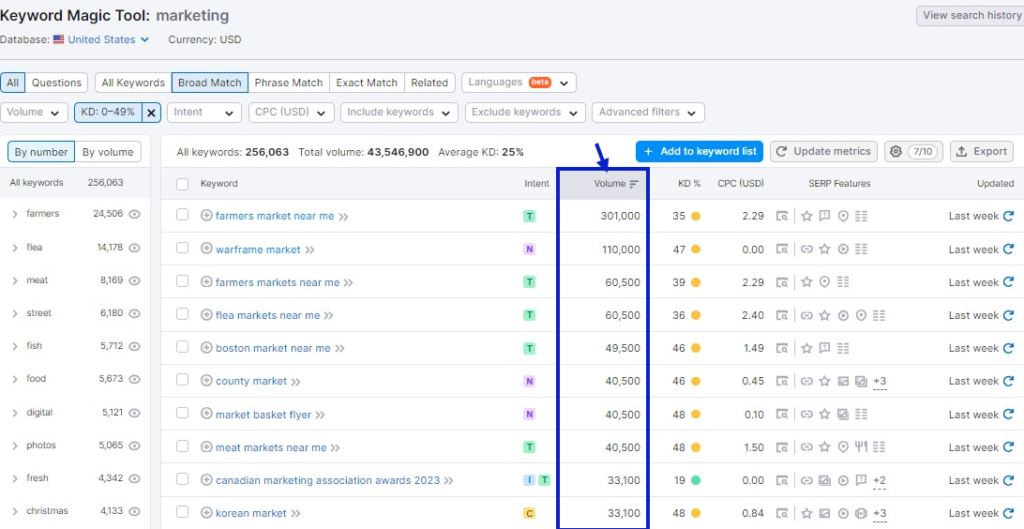
It’s not just about picking the keywords with the highest search volumes. You should also consider how well they match your website’s topic and what people are searching for.
2) Use Long-Tail Keywords
Use longer, more specific phrases that people might type into search engines. These are part of keyword optimization strategies and can help your content show up for niche topics.

The tool will rapidly provide various versions of your main keyword.
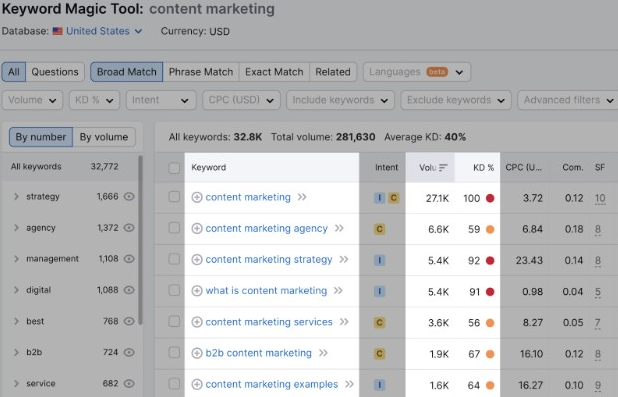
If you check the first few keywords, you’ll see they all have lots of searches but are tough to rank for. These aren’t long-tail keywords.
To find easier ones, we can filter the list and only show keywords with low ranking difficulty, which are typically long-tail keywords. Just click on the “KD” drop-down at the top and choose “Easy.”
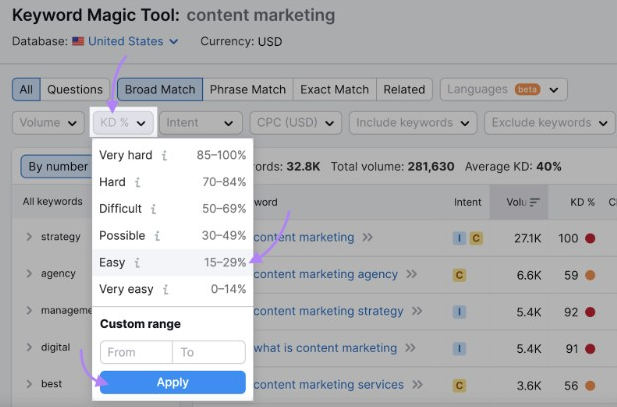
Now, you’ll find plenty of ideas for long-tail keywords.
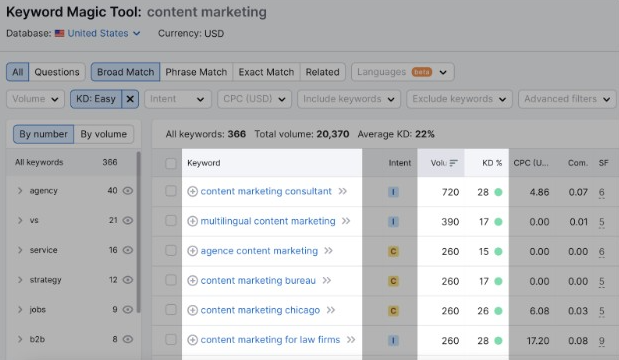
3) Keyword Placement
Putting your chosen keywords in smart spots throughout your content like titles, headings and paragraphs is a key part of keyword optimization strategies. This helps search engines figure out what your content is about. When they scan your page and see your keywords in these important places, it tells them your content is relevant to certain search queries.
But it’s not just for search engines—it’s also helpful for people reading your content. When they see your keywords in titles and headings, they quickly understand what your content is about. So, by strategically placing keywords, you’re making your content more searchable and understandable to both search engines and readers.
4) Use LSI (Latent Semantic Indexing) Keywords
Consider adding related words or phrases to your main keywords in your content. This can boost your keyword optimization strategies, making it easier for search engines to grasp what your content is all about.
When you include these additional terms—known as latent semantic indexing (LSI) keywords—they provide more context to your content. This means search engines can better understand the topic you’re covering and how it relates to users’ search queries.
For instance, if your main keyword is “recipe,” related LSI keywords might include “cooking methods,” “ingredients” or “meal preparation.” By using these terms naturally throughout your content, you’re not just expanding the scope of what your content covers but also strengthening its relevance to various search queries.
LSI keywords as part of your keyword optimization strategies isn’t just about repeating the same words over and over. It’s about enriching your content with related terms that make it more comprehensive and understandable to both search engines and your audience.
5) Optimize Meta Tags
Make sure your meta tags like titles and descriptions, include your target keywords. These show up in search results and can improve your keyword optimization strategies, encouraging people to click on your content.
6) Content Quality and Relevance
To get more traffic to your website, focus on creating high-quality content that answers their questions and provides valuable information. Make sure your content is relevant to topics your audience is interested in.
You can use Semrush’s Topic Research Tool to generate many content ideas quickly.
To increase your chances of getting more traffic from search engines, try the SEO Writing Assistant Tool. You can either write directly in the tool or paste the URL of your existing content from your website. The tool will review your content to ensure it’s easy to understand, unique and matches the right tone.
It will also help you optimize your content for search engines, making it more discoverable online. Following these suggestions can improve your content and attract more visitors to your website through search engines, which is part of effective keyword optimization strategies.
7) Regular Updates and Monitoring
Regular Updates and Monitoring are important tasks to keep your website performing well over time. By regularly checking how your keywords are performing, you can see if they’re still bringing in the right kind of traffic. If not, you might need to adjust your strategy.
Regular Updates and Monitoring mean keeping an eye on how well your keywords are doing and making changes as needed. Search engines are always changing, and new competitors might pop up, so it’s important to update your content regularly. This helps your website stay relevant and keeps your rankings high over time. By checking and tweaking your content regularly, you make sure you’re keeping up with the competition and staying visible to your audience.
One of the easiest ways to keep track of updates and monitor your performance is by using a tool like Position Tracking.
Enter your domain and click “Set up tracking.”
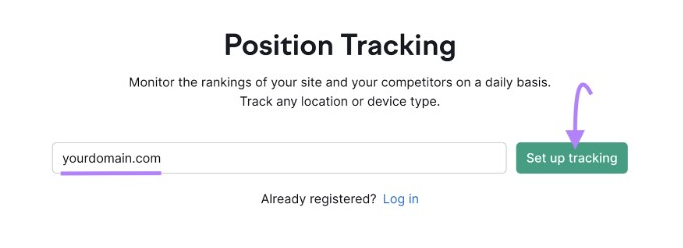
First, make sure you’ve provided all the necessary information for your targeting. Then, enter your keywords and choose “Add keywords to campaign.”
Lastly, click “Start tracking” to begin monitoring your keywords.
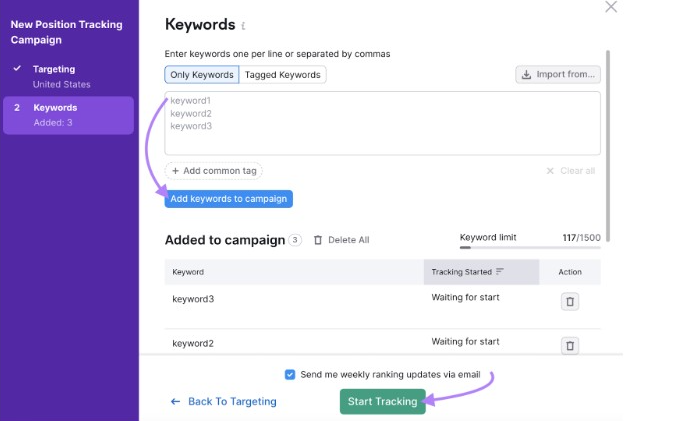
Once everything is set up, head to the “Overview” report. Here, you can start keeping an eye on your search visibility, where your website ranks in search results, estimated organic traffic and other important metrics.
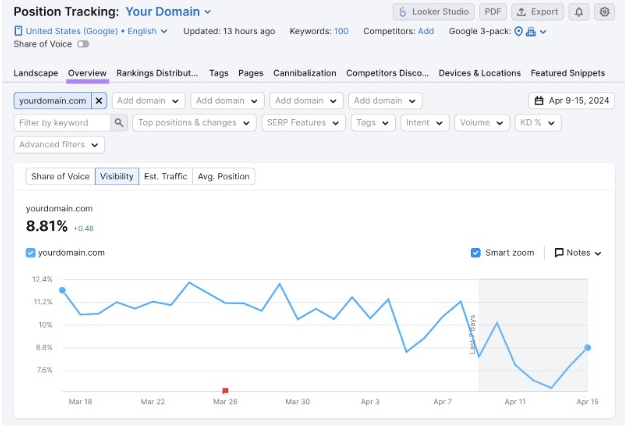
It will keep tracking your keywords over time, so if you notice a drop in performance, you can make adjustments more easily.
Conclusion
By using these tips for keyword optimization strategies, you’ll be successful with your SEO plan! A good plan with keywords can make your website show up more in search results and make more people click on it. This can lead to more sales or other good results.
Just remember not to use too many keywords or depend on them too much. Instead, focus on making really good content that happens to use the keywords you’re targeting.
Divyesh Savaliya
As an enthusiastic content writer by profession and an eager researcher, I delve into diverse subject matters to create the best SEO-optimized content pieces ready to captivate audiences








11 comments
Very interesting information!Perfect just what I was looking for!Raise range
I’m glad you found the information interesting and exactly what you were looking for! If you’re referring to expanding the range of topics or content, I’m happy to take suggestions. Let me know if there are specific areas you’d like to see covered!
I was examining some of your blog posts on this site and I conceive this website is rattling instructive!
Retain posting.Expand blog
Thank you so much for your kind words! I’m thrilled to hear that you find the website informative. I appreciate your encouragement and will definitely keep posting and expanding the blog. If you have any specific topics or questions you’d like to see covered, feel free to let me know!
Can you be more specific about the content of your article? After reading it, I still have some doubts. Hope you can help me.
Of course, I’d be happy to clarify any doubts you have about the article. Please let me know which specific parts or concepts you need more information on, and I’ll provide further details to help you.
Thanks for sharing. I read many of your blog posts, cool, your blog is very good.
I’m thrilled to hear that you’ve enjoyed reading my blog posts. If you have any questions or topics you’d like to see covered, feel free to let me know!
Your article helped me a lot, is there any more related content? Thanks!
Thank you, your article surprised me, there is such an excellent point of view. Thank you for sharing, I learned a lot.